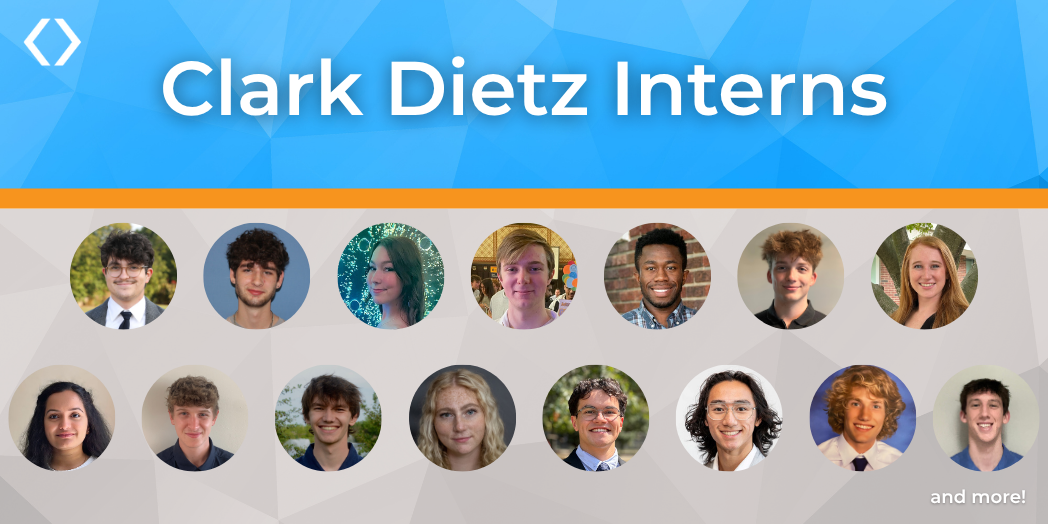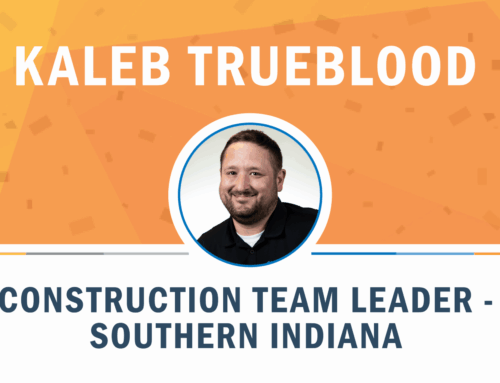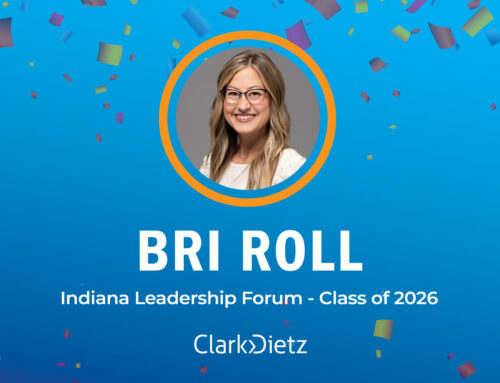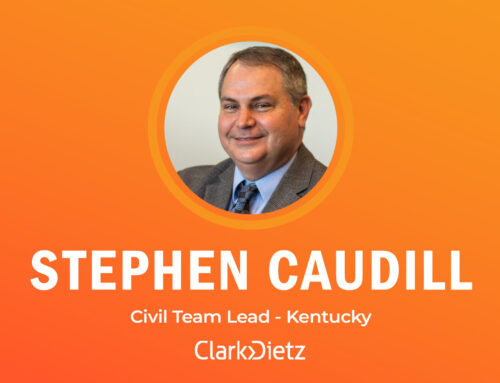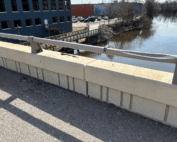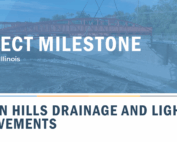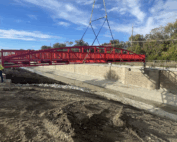At Clark Dietz, internships are more than just a summer job; they’re a launchpad for future professionals to develop their skills, collaborate with seasoned experts, and grow into leaders who improve the quality of life for clients and communities. Guided by values like integrity, innovation, and inclusion, the 2025 Internship Program was designed to offer hands-on experience and learning opportunities across the Midwest.
With 25 interns placed across Illinois, Wisconsin, Indiana, Kentucky, and Michigan, spanning engineering and communications roles, this year’s cohort tackled meaningful work, contributed to real infrastructure projects, and learned how the functional can become transformational.
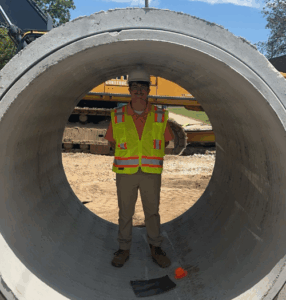
Alexander Lefever in a tube on a construction site.
Beyond the Technical
While many interns arrived eager to apply their technical knowledge, they soon discovered that strong communication, collaboration, and the ability to convey ideas clearly are just as essential to great engineering.
Throughout their internships, they engaged with real-world challenges that sharpened both their technical skills and their ability to work effectively with others; a balance reflected in their own insights.
“Every credentialed engineer has plenty of technical ability,” said Alexandar Lefever (Indianapolis, Ind., office), a civil engineering intern. “But what sets a great engineer apart is their people skills and ability to build a relationship with the client.”
That insight echoed across disciplines. Marketing intern Hannah Soukup (Oakbrook Terrace, Ill., office), who focused on digital content and social media, described how the experience helped her see the bigger picture: “I learned a great deal about how to make yourself better equipped for the workforce through building new skills,” she said. “The key is to not be afraid to step outside your comfort zone; you gain confidence through new experiences.”
Environmental engineering intern Mackenzie Winter (Champaign, Ill., office) also found that technical tools were only part of the learning equation: “I really enjoyed the GIS easement project,” she said. “Seeing the client interaction as we tried to figure out what information the Sanitary District of Decatur would need from their GIS was fascinating.”
Transportation engineering intern Mallika Morla (Champaign, Ill., office) agreed that being effective in the field required more than technical accuracy. “Clark Dietz taught me the importance of being thorough, understanding engineering plans, and seeing how real-world projects are designed and executed are lessons I’ll carry throughout my career,” she said.
For interns across disciplines, the experience at Clark Dietz underscored an important lesson: successful engineering requires more than technical expertise. Learning to communicate effectively, collaborate with others, and understand the client’s perspective are skills that shape well-rounded professionals. Gaining this awareness early in their careers gave interns a clearer understanding of what it takes to contribute meaningfully to real-world projects.
A Variety of Experiences
From CAD design and traffic analysis to blog writing and construction inspections, the interns’ daily work was as varied as the communities Clark Dietz serves.
Despite initial difficulties with Civil3D, Mackenzie discovered that overcoming those challenges with Civil3D and ArcGIS Pro strengthened her skills and boosted her confidence. “All AutoCAD software is incredibly useful, but also complex and powerful,” she said. “Civil3D gave me many issues throughout the summer as I slowly got more familiar with the program.”
Her favorite part? The rewarding process of turning historical legal documents into modern, visual deliverables. “I enjoyed learning to interpret easement language and reading documents over 75 years old,” Mackenzie said. “Translating all of this information into a drafting layer on ArcGIS Pro brought everything together really well.”
Nicholas Musgrave (Oakbrook Terrace, Ill., office), a civil engineering intern, found value in seeing different sides of project development: “Being able to see a bit from every project was really helpful in determining the future trajectory of my studies and my career,” he said. “What I loved most was talking to engineers at Clark Dietz and getting to know them and what drives them.”
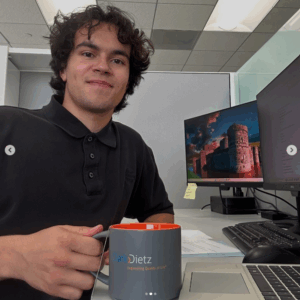
Nicholas Musgrave in the office.
In the field, Thomas Ott (New Albany, Ind., office), a civil/environmental engineering intern, worked on the New Albany Paving Program and saw how infrastructure changes impact neighborhoods directly: “I was able to see the transformation of residential areas and the joy new roads and sidewalks brought to the people who lived there,” he said.
Josh Rayl (Lansing, Mich., office), a traffic/transportation intern, appreciated the variety in his assignments, some days in the field, some in the office, while Jameson Cluver (Champaign, Ill., office), also a traffic/transportation intern, gained hands-on experience with AutoTurn calculations, pavement markings, and technical reports. The learning curve was steep at times, but that was part of the journey.
“What I found most challenging was the software like OpenRoads and MicroStation,” Jameson said, “but my prior internship helped me understand the vocabulary and concepts faster.”
For Mallika, the most rewarding experiences came from two projects in particular. “I really enjoyed working on the Garden Hills sidewalk design and the Curtis Road Grade Separation plans,” she said. “I learned a lot through both and got to see how design concepts take shape in real time.”
Her daily work included reviewing engineering plans, marking them up, assisting with calculations, attending meetings, and observing project progress both in the office and occasionally on-site. “Pay close attention to plans and standards,” she advised future interns, “and take every opportunity to observe real-world projects.”
Overall, interns walked away with hands-on experience in industry-standard tools—learning not just how to use them, but how to apply them in real-world situations.
A Culture That Supports Growth
At Clark Dietz, culture isn’t just a buzzword; it’s a lived experience grounded in collaboration, encouragement, and care. Interns described a welcoming and growth-focused environment where they felt comfortable asking questions and contributing from day one.
“The company prioritizes details and good work while also hiring fun and friendly professionals,” Nicholas shared.
Charles Knight (Chicago, Ill.), a transportation intern, added, “When everyone is in the office, it is pretty regular to hear laughs throughout the day. Everyone is very open to helping each other.”
That kind of atmosphere doesn’t happen by accident. Clark Dietz is intentional about building a workplace where people at all levels can grow, whether they’re interns just beginning their careers or seasoned professionals leading major projects. It’s a place where learning is hands-on, curiosity is welcomed, and every contribution matters.
Interns are fully integrated into the experience, taking part in real projects, working with cutting-edge tools, and learning from mentors who care deeply about their development. These opportunities aren’t just valuable in the moment—they lay the groundwork for long-term success.
In fact, many of our interns have returned to join the company full-time, and several now hold leadership roles. By investing in our interns, we’re investing in the future of Clark Dietz and the communities we serve.
Advice for the Class of 2026
As they wrap up their internships, this year’s cohort had some advice for future Clark Dietz interns:
Be curious and proactive. “Be a sponge with as much capacity as you can,” Alexander said. “Push yourself to get out of your comfort zone.”
Ask questions and connect the dots. Charles encouraged interns to dig deeper: “The more you ask earlier, the farther you can go independently later.”
Focus on the big picture. Nicholas suggested that interns take time to understand how the business works behind the scenes: “Try to learn not just about the work, but also how the company is structured and how it acquires and executes projects.”
Say yes. Hannah emphasized that trying new things, even when they feel out of your depth, is key to growing your confidence and skillset: “Even if you may not feel confident in your ability to complete certain tasks, it’s always worth a shot.”
Stay positive. Mackenzie offered this simple but effective advice: “Keep a positive attitude and turn everything into a learning opportunity.”
Stay eager to learn. Mallika encouraged future interns to “Ask questions, take initiative, and be open to learning. Pay close attention to plans and standards and take every opportunity to observe real world projects.”
Building More Than Infrastructure
At its core, the Clark Dietz internship experience is about discovering your potential and learning that infrastructure goes beyond the functional. Interns play a role in connecting people and revitalizing communities, and in doing so, they discover the power of their own contributions.
Many interns will return to Clark Dietz after graduation, bringing with them the experience, insight, and relationships they built during their time here.
“A huge thank you!” Nicholas said. “It’s been amazing to get to know and work with everyone in Clark Dietz’s office.”
If that sounds like the kind of place where you’d want to launch your career, then maybe next summer, it’s your turn to develop, collaborate, and grow with us.
To learn more about our internships, visit our Internships Page.
2025 Interns:
- Alexander Lefever – Rose-Hulman Institute of Technology
- Andrew Hoffman – UW-Platteville
- Char Huenke – University of Wisconsin-Milwaukee
- Charles Knight – University of Illinois Urbana-Champaign
- Hannah Soukup – Northern Illinois University
- Jack Holder – Queen’s University
- Jameson Cluver – University of Tennessee at Martin
- Josh Rayl – Michigan State University
- Krystian Boron – Iowa State University
- Landon Heimstead – Arizona State University
- Luke Henry – Michigan State University
- Lyza Brandner – Michigan Technological University
- Mackenzie Winter – University of Illinois Urbana-Champaign
- Mallika Morla – Texas Tech University
- Marcus Hansis – University of Kansas
- Matthew Willis – University of Illinois Urbana-Champaign
- Megan Mida – Michigan State University
- Nicholas Musgrave – University of Illinois Urbana-Champaign
- Owen Zeisler – Marquette University
- Phi Huynh – University of Illinois Urbana-Champaign
- Raymen Vue – Milwaukee School of Engineering
- Sam Clore – Purdue University
- Sarah Varghese – Illinois Institute of Technology
- Thomas Ott – Indiana Wesleyan University
- Ty Suchon – Northcentral Technical College


